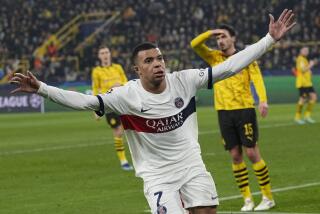In the ultimate game of the feet, believe the guy with eight arms
- Share via
From Johannesburg, South Africa — The World Cup ends Sunday, and Paul, the tournament’s favorite psychic sea creature, can sink back into his aquarium tank in Oberhausen, Germany, and finally relax.
There will be no more pressure for him, no more predictions on what some two-legged land-dwellers might or might not achieve on a soccer field; no more having to guess correctly or be upstaged by an uppity, bandwagon-jumping parakeet in Singapore.
But if Paul can see the end of the road, the same is not yet true for the players of Spain and the Netherlands, who square off Sunday night in Johannesburg’s Soccer City.
For them, it all comes down to 90 minutes, or perhaps 120, that will determine whether they fly home as world champions or as also-rans. The pressure is immense. Neither the Dutch nor the Spanish have ever won the World Cup, and the hopes and dreams of millions rest on the outcome.
So do the savings of more than a few who have wagered the odd dollar or two, but that’s a financial matter. For most, it’s a matter of national pride.
If the Netherlands wins, the team plane will be met as it crosses into Dutch airspace by an orange-painted fighter jet and escorted to Amsterdam. A floating victory parade is planned for Tuesday on the city’s famed canals. Attendance, if you are Dutch, is not optional.
If Spain wins, similar festivities are in the offing. To boost the chances of La Furia Roja walking off with the trophy, Rafael Nadal has winged his way in from Wimbledon to lend his support, and Queen Sofia will be on hand to bestow the royal whatever it is . . . luck, perhaps.
Good fortune or not, it will come down to one moment and one player who will score the decisive goal.
For the Netherlands, it could be winger Arjen Robben, after a mazy dribble and off that lethal left foot, or midfield creator Wesley Sneijder off either foot, or workhorse Dirk Kuyt off almost any part of his body.
For Spain, it could be forward David Villa who scores off a through ball from Andres Iniesta, or Xabi Alonso who tucks the goal away off a pass from Xavi — the old Xavi-Xabi play on the chalkboard of Xs and no O’s — or even Carles Puyol with another dramatic header.
Both teams, in other words, are packed with attacking potential. The Spanish will not change their style just because they are in their first final. They will continue to possess the ball, continue to swing it from player to player, this way and that, they will continue to bewitch and bewilder before they strike. Think cobras in cleats.
“No one moves the ball as well as the Spanish team,” said former Dutch international forward Ruud van Nistelrooy.
“We live and die by those ideas,” Iniesta said. “We don’t know any other way to play. So we’ll try to do the same things in the final and hopefully we’ll have the luck to win it.”
The Spanish newspaper El Pais put it this way: “If football is art and heroism, Spain is the team to follow.”
The Dutch, meanwhile, will take a more plebeian approach. Sure, Robben can dribble and Sneijder can dazzle, but utility man Kuyt personifies the team with his nonstop effort, nonstop running, and by working equally hard on defense and offense. He can finish too.
Coach Bert van Marwijk has drilled discipline and organization into the Dutch players. They know their roles but also know when they can step out of those roles and surprise.
“They’re very similar to us, players of great technical ability in midfield,” said Spain Coach Vicente del Bosque. “Players of great quality and very fast, that don’t improvise as much as we do but play a more dangerous direct game.”
The Netherlands comes in knowing it has been here before, and failed — in the finals of 1974 and 1978. That is why industry has been placed ahead of artistry in the Oranje’s latest quest for the title.
“I’d rather play an extremely ugly game and win, instead of a beautiful one and lose,” Robben said. “In the past, we heard often how beautiful it was, but there was no payback.”
After Spain defeated Germany to reach the final, Del Bosque, in a bit of a stretch, said: “The players were like young wild boar.” That raised an eyebrow or two, but the meaning was clear.
So is the Spanish desire not to let this opportunity slip.
“There are some marvelous things in Spain and one of them is football,” Del Bosque said. “We have been deprived of success for so long and now we deserve to triumph and be at the top.”
In Singapore, the unnamed but all-seeing parakeet likes the Dutch. In Oberhausen, Paul says it will be Spain. Go with the octopus.
More to Read
Go beyond the scoreboard
Get the latest on L.A.'s teams in the daily Sports Report newsletter.
You may occasionally receive promotional content from the Los Angeles Times.







